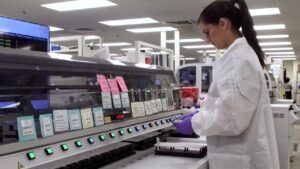Decades-old research from 3M indicates that toxic PFAS chemicals are present in sewage sludge used as fertilizer, yet the E.P.A. continues to endorse this practice without mandatory testing. Concerns from various experts underline the potential environmental and public health risks.
E.P.A.’s Continued Support for Contaminated Fertilizer Raises Alarm

E.P.A.’s Continued Support for Contaminated Fertilizer Raises Alarm
A review reveals early warnings about toxic “forever chemicals” in fertilizers, prompting calls for regulatory change.
The ongoing debates around the use of sewage sludge as fertilizer are intensifying, especially with the revelation that the Environmental Protection Agency (E.P.A.) has been promoting a product that may contain hazardous substances known as PFAS, or “forever chemicals.” Research conducted by scientists at 3M in the early 2000s disclosed the alarming presence of these toxic compounds in wastewater, which is often repurposed as fertilizer across American farmland.
Despite the serious health implications tied to PFAS—such as a higher risk of cancer and birth defects—the E.P.A. has maintained its endorsement of sewage sludge fertilizer. This practice has been scrutinized given that 3M privately alerted the agency about these findings during a 2003 meeting, highlighting the potential risk of contaminating agricultural soil with “forever chemicals.”
Concerns have been echoed by various stakeholders, including whistle-blowers, scientists, and state authorities, who argue that the lack of mandatory testing for these harmful contaminants poses a grave danger to public health and the environment. David Lewis, formerly of the E.P.A., underscored the dire consequences of continuing to spread sewage sludge, noting that it creates long-term contamination of soil.
The E.P.A.’s reluctance to reassess its position on using sewage sludge for fertilization can be perplexing. Critics argue this disregard goes against growing scientific evidence calling for a more cautious approach to environmental safety and agricultural practices. As the government agency continues to promote an outdated method, the conversation around sustainable and safe farming practices remains critical and urgent.






















